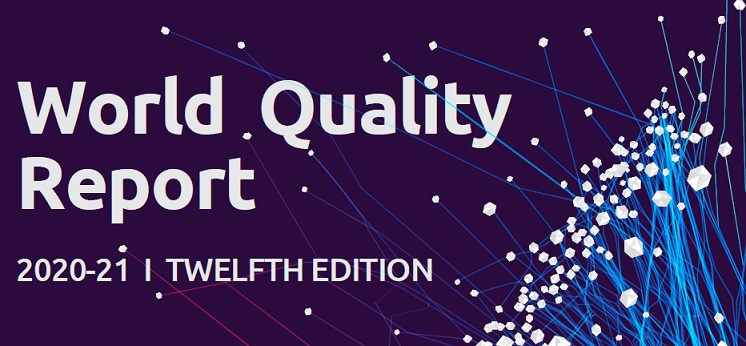StackGen has partnered with Google Cloud Platform (GCP) to bring its platform to the Google Cloud Marketplace.
Quality assurance (QA) is steadily evolving from a backroom discipline to an integral part of wider enterprise digital transformation, according to the World Quality Report 2020-21 (WQR) from Capgemini, Sogeti, and Micro Focus.

Contributing to business growth and business outcomes was the highest rated objective for testing and QA at 74% — up 6 percentage points from 2018.
The WQR 2020 highlights that expectations from QA have been increasing with an upward trend across various strategic objectives including the need for QA to support business growth and the importance of ensuring end-user satisfaction.
There has been steady and promising progress hindered only slightly by recurring struggles, also noted in previous editions, that include skill gaps and getting a return on investment on test automation.
Adoption of agile and DevOps increasing
In line with the trend observed in the last two years, this year too saw an acceleration in the adoption of Agile and DevOps methodologies.
While there is a marked focus in increasing the level of test automation and shifting testing to the left using Agile and DevOps, achieving higher levels of in-sprint automation and lack of expertise within the QA team to achieve the desired objectives remain challenging.
High expectations for AI and ML
The uptake of artificial intelligence (AI) and machine learning (ML) in QA has also increased.
88% of respondents said that AI was now the strongest growth area of their test activities, and 86% consider AI a key criterion for selecting new QA solutions.
Even though the benefits may not yet be fully in reach, the vast majority are enthusiastic about the prospects for AI and ML.
The greatest challenge in applying AI and ML in QA was identified as skill gaps, mentioned by 34% of respondents (down two percentage points from last year).
Test automation: Organizations working to control QA activities
Previous World Quality Reports have consistently shown challenges in the test automation arena. In achieving quality assurance to a professional’s desired level of test automation, the most common challenge in 2019 was the frequency with which applications were changing. In previous years, the lack of people with sufficient specialist skills and experience within test automation was highlighted.
In the 2020 survey organizations expressed a degree of confidence when they were asked for their views on various aspects of test automation: 68% said they have the required automation tools while 63% have enough time to automate tests.
However, despite these promising statistics, only 37% felt they get a return on that investment, indicating a gap between confidence and results.
COVID-19 and QA
As a result of the pandemic, 47% of respondents said there would be significantly greater focus on customer experience validation and on usability testing.
Meanwhile, 43% of respondents said that the focus on more and better collaboration tools will go up, and 34% said they will need more remote access to test systems and test environments.
There have also been COVID-19-related QA implications around security: 83% of CIOs and IT directors said their application security concerns have increased over the past 12 months, likely a result of the move to a remote working world.
"Despite the challenges brought about by COVID-19 it’s been a promising year for orchestration and quality assurance in the enterprise," says Mark Buenen, Global Leader of Digital Assurance and Quality Engineering Services at Capgemini Group. "In fact, COVID-19 has acted as an accelerator for QA, demonstrating its integral importance to operations. It’s encouraging to see that QA professionals are optimistic about their testing capabilities. However, as the findings show, this optimism does not always match up to results. By relying more on cloud infrastructure and progressing further with AI for QA, these teams will be able to work faster, smarter and have greater business impact."
Industry News
Tricentis announced its spring release of new cloud capabilities for the company’s AI-powered, model-based test automation solution, Tricentis Tosca.
Lucid Software has acquired airfocus, an AI-powered product management and roadmapping platform designed to help teams prioritize and build the right products faster.
AutonomyAI announced its launch from stealth with $4 million in pre-seed funding.
Kong announced the launch of the latest version of Kong AI Gateway, which introduces new features to provide the AI security and governance guardrails needed to make GenAI and Agentic AI production-ready.
Traefik Labs announced significant enhancements to its AI Gateway platform along with new developer tools designed to streamline enterprise AI adoption and API development.
Zencoder released its next-generation AI coding and unit testing agents, designed to accelerate software development for professional engineers.
Windsurf (formerly Codeium) and Netlify announced a new technology partnership that brings seamless, one-click deployment directly into the developer's integrated development environment (IDE.)
The Cloud Native Computing Foundation® (CNCF®), which builds sustainable ecosystems for cloud native software, is making significant updates to its certification offerings.
The Cloud Native Computing Foundation® (CNCF®), which builds sustainable ecosystems for cloud native software, announced the Golden Kubestronaut program, a distinguished recognition for professionals who have demonstrated the highest level of expertise in Kubernetes, cloud native technologies, and Linux administration.
Red Hat announced new capabilities and enhancements for Red Hat Developer Hub, Red Hat’s enterprise-grade internal developer portal based on the Backstage project.
Platform9 announced that Private Cloud Director Community Edition is generally available.
Sonatype expanded support for software development in Rust via the Cargo registry to the entire Sonatype product suite.
CloudBolt Software announced its acquisition of StormForge, a provider of machine learning-powered Kubernetes resource optimization.




